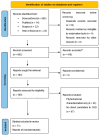Exploring the Role of Phenolic Compounds in Chronic Kidney Disease: A Systematic Review
- PMID: 38893451
- PMCID: PMC11173950
- DOI: 10.3390/molecules29112576
Exploring the Role of Phenolic Compounds in Chronic Kidney Disease: A Systematic Review
Abstract
Chronic kidney disease (CKD) presents a formidable global health concern, affecting one in six adults over 25. This review explores the potential of phenolic compounds in managing CKD and its complications. By examining the existing research, we highlight their diverse biological activities and potential to combat CKD-related issues. We analyze the nutritional benefits, bioavailability, and safety profile of these compounds. While the clinical evidence is promising, preclinical studies offer valuable insights into underlying mechanisms, optimal dosages, and potential side effects. Further research is crucial to validate the therapeutic efficacy of phenolic compounds for CKD. We advocate for continued exploration of their innovative applications in food, pharmaceuticals, and nutraceuticals. This review aims to catalyze the scientific community's efforts to leverage phenolic compounds against CKD-related challenges.
Keywords: chronic liver diseases; diabetes; herbal medicine; nephrotoxicity; renal injury.
Conflict of interest statement
The authors declare no conflicts of interest.
Figures
Similar articles
-
Upcoming drug targets for kidney protective effects in chronic kidney disease.Nephrol Dial Transplant. 2025 Feb 5;40(Supplement_1):i47-i58. doi: 10.1093/ndt/gfae216. Nephrol Dial Transplant. 2025. PMID: 39907540 Free PMC article. Review.
-
Design considerations for future renoprotection trials in the era of multiple therapies for chronic kidney disease.Nephrol Dial Transplant. 2025 Feb 5;40(Supplement_1):i70-i79. doi: 10.1093/ndt/gfae210. Nephrol Dial Transplant. 2025. PMID: 39907541 Free PMC article.
-
Angiotensin-converting enzyme inhibitors and angiotensin receptor blockers for adults with early (stage 1 to 3) non-diabetic chronic kidney disease.Cochrane Database Syst Rev. 2023 Jul 19;7(7):CD007751. doi: 10.1002/14651858.CD007751.pub3. Cochrane Database Syst Rev. 2023. PMID: 37466151 Free PMC article.
-
Cardiorenal Benefits of SGLT2 Inhibitors in Patients with Chronic Kidney Disease and Concomitant Hypertension.Cardiorenal Med. 2025;15(1):496-509. doi: 10.1159/000545622. Epub 2025 Apr 21. Cardiorenal Med. 2025. PMID: 40258345 Review.
-
Systemic pharmacological treatments for chronic plaque psoriasis: a network meta-analysis.Cochrane Database Syst Rev. 2021 Apr 19;4(4):CD011535. doi: 10.1002/14651858.CD011535.pub4. Cochrane Database Syst Rev. 2021. Update in: Cochrane Database Syst Rev. 2022 May 23;5:CD011535. doi: 10.1002/14651858.CD011535.pub5. PMID: 33871055 Free PMC article. Updated.
Cited by
-
Nutritional content and renoprotective potential of miracle tree (Moringa oleifera).BioTechnologia (Pozn). 2025 Jun 30;106(2):223-239. doi: 10.5114/bta/204529. eCollection 2025. BioTechnologia (Pozn). 2025. PMID: 40703714 Free PMC article. Review.
-
Aggressive Intravenous Hydration and a Defined Plant-Based Diet Safely and Effectively Treated Type 5 Cardiorenal Syndrome with Stage E Heart Failure-Related Cardiogenic Shock: A Case Report.Reports (MDPI). 2024 Nov 8;7(4):94. doi: 10.3390/reports7040094. Reports (MDPI). 2024. PMID: 40757731 Free PMC article.
-
Association between dried fruit intake and kidney function: research from univariate and multivariate Mendelian randomized studies.Front Nutr. 2024 Oct 23;11:1440896. doi: 10.3389/fnut.2024.1440896. eCollection 2024. Front Nutr. 2024. PMID: 39507905 Free PMC article.
-
Optimization of Combined Ultrasound and Microwave-Assisted Extraction for Enhanced Bioactive Compounds Recovery from Four Medicinal Plants: Oregano, Rosemary, Hypericum, and Chamomile.Molecules. 2024 Dec 6;29(23):5773. doi: 10.3390/molecules29235773. Molecules. 2024. PMID: 39683930 Free PMC article.
References
-
- Bikbov B., Purcell C.A., Levey A.S., Smith M., Abdoli A., Abebe M., Adebayo O.M., Afarideh M., Agarwal S.K., Agudelo-Botero M., et al. Global, Regional, and National Burden of Chronic Kidney Disease, 1990–2017: A Systematic Analysis for the Global Burden of Disease Study 2017. Lancet. 2020;395:709–733. doi: 10.1016/S0140-6736(20)30045-3. - DOI - PMC - PubMed
-
- Xie Y., Bowe B., Mokdad A.H., Xian H., Yan Y., Li T., Maddukuri G., Tsai C.Y., Floyd T., Al-Aly Z. Analysis of the Global Burden of Disease Study Highlights the Global, Regional, and National Trends of Chronic Kidney Disease Epidemiology from 1990 to 2016. Kidney Int. 2018;94:567–581. doi: 10.1016/j.kint.2018.04.011. - DOI - PubMed
-
- Foreman K.J., Marquez N., Dolgert A., Fukutaki K., Fullman N., McGaughey M., Pletcher M.A., Smith A.E., Tang K., Yuan C.W., et al. Forecasting Life Expectancy, Years of Life Lost, and All-Cause and Cause-Specific Mortality for 250 Causes of Death: Reference and Alternative Scenarios for 2016–40 for 195 Countries and Territories. Lancet. 2018;392:2052–2090. doi: 10.1016/S0140-6736(18)31694-5. - DOI - PMC - PubMed
Publication types
MeSH terms
Substances
LinkOut - more resources
Full Text Sources
Medical




